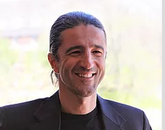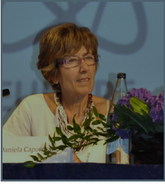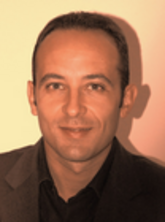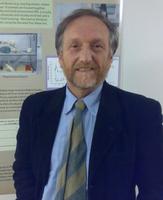About the Organizers

Davide Ponzi
Davide Ponzi is in a tenure track position (Ricercatore di tipo B) in the Unit of Neuroscience, Dipartimento di Medicina e Chirurgia, Università di Parma, Italy. He graduated in Biological Sciences from the University of Parma and spent several years in the United States of America as a post-doctoral fellow (University of Missouri, Department of Biological Sciences; Institute for Mind and Biology, University of Chicago) and as an assistant Professor of Biological Psychology (Oklahoma State University). Using an evolutionary framework, his research focuses on the hormonal, cardiovascular and circadian influences on people decision making, risk taking and performance under different types of stressful situations. A special emphasis of his research program is that of the effects of early social experiences on children’s neuroendocrine and behavioral development.

Daniela Caporossi
Daniela Caporossi is Full Professor of Applied Biology at the Università di Roma “Foro Italico”, Department of Movement, Human and Health Sciences. She's the chair of the Unit of Biology and Genetics of Human Movement, chair of the University Research Committee and chair of the European MSc in Health and Physical Activity (Laurea Magistrale Internazionale in Attività Fisica e Salute – LM67-I). She graduated in biological sciences from “La Sapienza” University in Rome, followed by post-doc position in Rome (Tor Vergata University) and Hamilton (McMaster University, Canada). She got a faculty position from 1984 in Rome, followed by professorship at the “Tor Vergata” University, Faculty of Medicine, and, from 2006, at the “Foro Italico” University, in Rome, where she established a new research group working on the cellular and molecular basis of health-related physical activity. Her current research interests include: a) genetic and epigenetic mechanisms in systemic adaptation to exercise, b) exercise and redox imbalance in counteracting skeletal muscle wasting in aging and diseases, c) the role of free radicals in cell signaling and modulation of gene expression in skeletal and cardiac muscle.

Alessandro Sale
Dr.Alessandro Sale is currently Head of the Pisa-Florence section of the Neuroscience Institute of CNR (National Research Council of Italy). He has completed his Ph.D in Neurobiology from the Scuola Normale Superiore of Pisa (Italy) and postdoctoral studies from the Scuola Normale and the Centre for the Biology of Memory of the Norwegian University of Science and Technology, Trondheim (Norway). He holds a permanent position as Senior Research Scientist at the Neuroscience Institute of CNR. His research activity is primarily focused on the influence of environmental stimulation on central nervous system development and plasticity, with particular emphasis on the effects elicited by paradigms of non-invasive enriched experience on both the healthy and the pathological brain.

Stefano Parmigiani
Stefano Parmigiani is professor Emeritus of Applied Biology at the Dipartimento di Medicina e Chirurgia, Università di Parma, Italy. His research interest is characterized by a multidisciplinary approach ranging from Ethology, Psychobiology, Behavioral Endocrinology and Behavioral Neuroscience in animal models (i.e. Causations and functions of male and female mice social aggression; Neurochemical correlates of different forms of aggression: ethopharmacological analysis of maternal aggression, inter-male attack and infanticide; Effects of prenatal exposure to drug, man -made Endocrine Disrupting Chemichals and stress on neuro-endocrine development and socio-sexual behavior of mice) and recently Evolutionary Psychology. (Relationship between personality traits, neuroendocrine responses and competition outcome in martial arts athletes; The role of social stress and individual vulnerability in the genesis of male psychogenic sexual disorders). Member of the Permanent Monitoring Panels (PMP) of Pollution and Sustainable Development of the International Seminars on Planetary Emergencies of the EMFCSC dealing with Developmental Effects of pre and perinatal exposure to Endocrine Disrupting Chemicals on reproduction, physiology, brain and behavior in animals and humans. He organized and directed several workshops of the International School of Ethology e.g. Ethology and Psychobiology of fear and defense; Protection and Abuse of Young in Animals and Man; Ethology & Biomedical Research; Impact of Endocrine Disrupting Chemicals (EDC) on Brain development and Behavior; Social stress: impact on Physiology and Behavior; Neuroeconomics: recent Advances and Future Directions; Adapted Mind, adapted Body: the Evolution of Human Behavior and its Endocrine Regulation; Animal and Human Emotions; Translational Neuroscience and Mental Disorders: bridging the gap between animal models and human condition and as antecedents of the present workshop on rituals, belief and religious mind The Evolution of Morality: the Biology and Philosophy of Human Conscience (2012); What made us Humans?: Biological and Cultural Evolution of Homo Sapiens (2014); The Symbolic animal: Evolution and Neuroethology of Aesthetics (2016) that generated books and /or special issues of International Journals